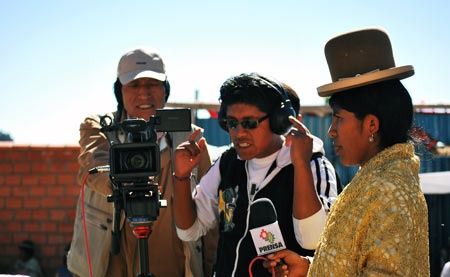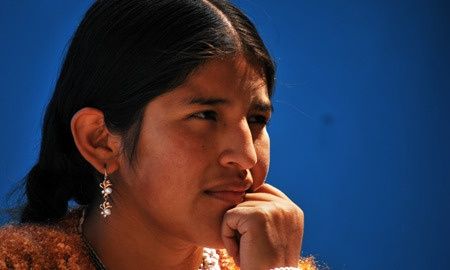Bolivia: Igniting Reel Change - Photo Gallery
photographs by James Stairs and Delphine Denoiseux
On behalf of Oxfam-Quebec, documentary filmmaker Frédéric Julien and his partner Delphine Denoiseux are sent to Bolivia to help shed light on some of the major issues facing indigenous communities. The duo team up with Franklin Gutiérrez Zarate, a Bolivian teacher and documentary producer with the non-governmental organization Centro de Formación y Realización Cinematográfica (Centre for Cinema and Film Making). The aim of their project is to help young aboriginal Bolivians construct four short films, each of which exposes a current social issue and attempt to re-establish their identity. The filmmakers act as mentors to the native Bolivians, providing them with the skills necessary to develop local and national media organizations, which can play a major role in addressing the traditional inequality faced by Bolivia's aboriginal population.
Produced with the support of the Government of Canada through the Canadian International Development Agency.
-
DSC 0563 DSC 0563
Frédéric Julien, a Montreal documentary filmmaker, chats with his team prior to shooting. Julien is one of the project mentors, sent to Bolivia to help the filmmakers express their ideas and teach its native people the skills to help develop local and national media organizations.
Delphine Denoiseux
-
DSC 0389 DSC 0389
The corner room on the third floor of the Residencial Sucre is very different from the other rooms in this hotel in downtown Copacabana, Bolivia. The windows are closed and the drapes are pulled, preventing light and noise from the cobblestone streets below from disturbing the eleven people who are packed inside preparing the documentaries.
Delphine Denoiseux
-
Beds and furniture have been removed and a pile of mattresses lines one wall. The room glows with the light emitted by four large computer monitors. Small groups huddle around work stations in each of the four corners of the room, pointing at the screens in deep discussion.13 Sucrehotel 13 Sucrehotel

-
Delphine Denoiseux, a Belgian journalist sent to Bolivia on behalf of Oxfam-Quebec, brainstorms story ideas with team members in Copacabana.Bolivia 1 DelphineSucre Bolivia 1 DelphineSucre
James Stairs
-
IMG 0357 IMG 0357
Members of the film crew in Copacabana take a brief break to pose for a photo. They are part of the 18 young aboriginal participants working with Julien and Denoiseux to create documentary films exploring aspects of their lives and the issues facing their communities - including water pollution, inequality, and the effects of globalization on small rural villages and their people.
Delphine Denoiseux
-
DSC 0984 DSC 0984
"Actress" and film crew member in Copacabana and Cochabamba, María Huarina Mamani and her daughter, Brigite.
Delphine Denoiseux
-
Elias Elias
Another native Bolivian film crew member in Copacabana, Elias. He, along with the others, are using film as a means to tackle the serious issues facing his community of 6 000 people, which sits on the shores of Lake Titicaca, high on the Bolivian altiplano.
Delphine Denoiseux
-
DSC 0104 DSC 0104
Reynaldo Yujra is a facilitateur of CEFREC (Centre for Cinema and Film Making), a non-governmental organization that provides technical training in film and video for the indigenous people of Bolivia and assists in producing and distributing their work.
Delphine Denoiseux
-
DSC 0323 DSC 0323
Film crew members, Reynaldo Yujra (left), Stif Pizarro (centre), and Francisca (right) working hard in Marke Qosco.
Delphine Denoiseux
-
Standing in central Copacanbana and squinting into the afternoon sun, project participant and 18 year old, Sandra Chuquimia talks about the film she has just completed, looking at the issue of economic migration.DSC 0880 DSC 0880
Delphine Denoiseux
-
DSC 0164 DSC 0164
Sandra's parents, migrant workers who left the small rural village of Chachapoya for the major urban centre of La Paz.
Delphine Denoiseux
-
DSC 0409 DSC 0409
On set in Copacabana. Silence...action!
Delphine Denoiseux
-
DSC 0019 DSC 0019
Filmmakers interview Jorge, a traditional dancer in the community.
Delphine Denoiseux
-
DSC 0005 DSC 0005
The crew capture native Bolivians performing the traditional dance called, "Espijillani".
Delphine Denoiseux
-
DSC 0099 DSC 0099
Reporters carry out interviews for Radio Copacabana, Copacabana's current indigenous radio station - part of a larger national aboriginal network. Plans to add a community television channel represents a major victory in a decade-long battle for visibility and equality.
Delphine Denoiseux
-
DSC 0800 DSC 0800
In the community of Camacachi, the crew films a fishing scene on Lake Titicaca that will be used in the third documentary about the effects of water pollution for fisherman and the community.
Delphine Denoiseux
-
DSC 0756 DSC 0756
Filmmakers, William and Jimena, set up to film the project of Maria et Adalid - the two lead characters in the fishing film.
Delphine Denoiseux
-
DSC 1020 DSC 1020
Jimena and William shoot the preparation of the Aymara New Year ceremony on June 21. This project highlights the family transmission of traditional knowledge.
Delphine Denoiseux
-
DSC 0026 2 DSC 0026 2
Crew members experience the arrival of the first rays of sun, June 21.
Delphine Denoiseux
-
Bolivia camera Bolivia camera
Julien and crew members prepare to shoot in Carretilleros.
Delphine Denoiseux
-
4 Rodaje dengue 4 Rodaje dengue
Shooting scenes for "Dengue".
Delphine Denoiseux
-
4 WapikoniLunch 4 WapikoniLunch
Project members prepare a traditional Bolivian lunch during a pre-production trip to Hueco.
James Stairs
-
Filming in the small village of Hueco.6 WapikoniField 6 WapikoniField
James Stairs
-
CEFREC lead-instructor Franklin Gutiérrez Zarate, left, helps out during post-production. Zarate explains that prior to the idigenous rights movement in the 80s, aboriginals "weren't seen as humans with emotions and the ability to contribute to the country". Through film, Zarate and his crews are helping positively transform this perspective.12 ZarateBoliviaHotel 12 ZarateBoliviaHotel
James Stairs
-
DSC 0392 DSC 0392
Project members in the "editing suite" huddle around one of the four work stations in the single hotel room.
Delphine Denoiseux
-
3 SandraEdit 3 SandraEdit
Sandra and Denoiseux deep in discussion during an editng session.
James Stairs
-
11 frededit3 11 frededit3
Julien, Jimena and crew work hard finalizing the finishing details.
James Stairs
-
Projection Garay 4 Projection Garay 4
An evening of film watching in Ayoreo. The films have been shown across Bolivia on a burgeoning network of community media, and around the world via the film festival circuit.
Delphine Denoiseux
Frédéric Julien, a Montreal documentary filmmaker, chats with his team prior to shooting. Julien is one of the project mentors, sent to Bolivia to help the filmmakers express their ideas and teach its native people the skills to help develop local and national media organizations.
Delphine Denoiseux
The corner room on the third floor of the Residencial Sucre is very different from the other rooms in this hotel in downtown Copacabana, Bolivia. The windows are closed and the drapes are pulled, preventing light and noise from the cobblestone streets below from disturbing the eleven people who are packed inside preparing the documentaries.
Delphine Denoiseux
James Stairs
Members of the film crew in Copacabana take a brief break to pose for a photo. They are part of the 18 young aboriginal participants working with Julien and Denoiseux to create documentary films exploring aspects of their lives and the issues facing their communities - including water pollution, inequality, and the effects of globalization on small rural villages and their people.
Delphine Denoiseux
"Actress" and film crew member in Copacabana and Cochabamba, María Huarina Mamani and her daughter, Brigite.
Delphine Denoiseux
Another native Bolivian film crew member in Copacabana, Elias. He, along with the others, are using film as a means to tackle the serious issues facing his community of 6 000 people, which sits on the shores of Lake Titicaca, high on the Bolivian altiplano.
Delphine Denoiseux
Reynaldo Yujra is a facilitateur of CEFREC (Centre for Cinema and Film Making), a non-governmental organization that provides technical training in film and video for the indigenous people of Bolivia and assists in producing and distributing their work.
Delphine Denoiseux
Film crew members, Reynaldo Yujra (left), Stif Pizarro (centre), and Francisca (right) working hard in Marke Qosco.
Delphine Denoiseux
Delphine Denoiseux
Sandra's parents, migrant workers who left the small rural village of Chachapoya for the major urban centre of La Paz.
Delphine Denoiseux
On set in Copacabana. Silence...action!
Delphine Denoiseux
Filmmakers interview Jorge, a traditional dancer in the community.
Delphine Denoiseux
The crew capture native Bolivians performing the traditional dance called, "Espijillani".
Delphine Denoiseux
Reporters carry out interviews for Radio Copacabana, Copacabana's current indigenous radio station - part of a larger national aboriginal network. Plans to add a community television channel represents a major victory in a decade-long battle for visibility and equality.
Delphine Denoiseux
In the community of Camacachi, the crew films a fishing scene on Lake Titicaca that will be used in the third documentary about the effects of water pollution for fisherman and the community.
Delphine Denoiseux
Filmmakers, William and Jimena, set up to film the project of Maria et Adalid - the two lead characters in the fishing film.
Delphine Denoiseux
Jimena and William shoot the preparation of the Aymara New Year ceremony on June 21. This project highlights the family transmission of traditional knowledge.
Delphine Denoiseux
Crew members experience the arrival of the first rays of sun, June 21.
Delphine Denoiseux
Julien and crew members prepare to shoot in Carretilleros.
Delphine Denoiseux
Shooting scenes for "Dengue".
Delphine Denoiseux
Project members prepare a traditional Bolivian lunch during a pre-production trip to Hueco.
James Stairs
James Stairs
James Stairs
Project members in the "editing suite" huddle around one of the four work stations in the single hotel room.
Delphine Denoiseux
Sandra and Denoiseux deep in discussion during an editng session.
James Stairs
Julien, Jimena and crew work hard finalizing the finishing details.
James Stairs
An evening of film watching in Ayoreo. The films have been shown across Bolivia on a burgeoning network of community media, and around the world via the film festival circuit.
Delphine Denoiseux



























